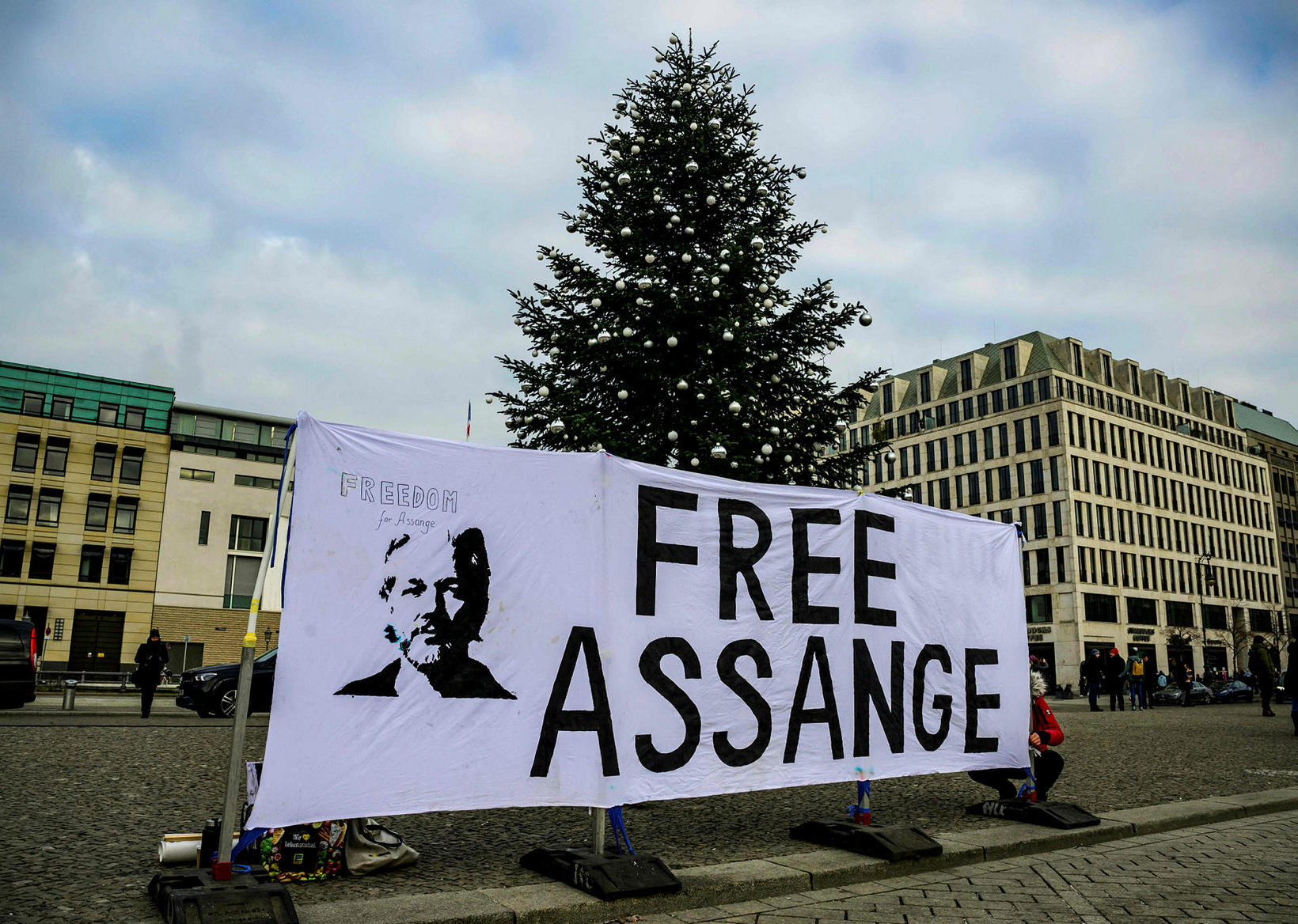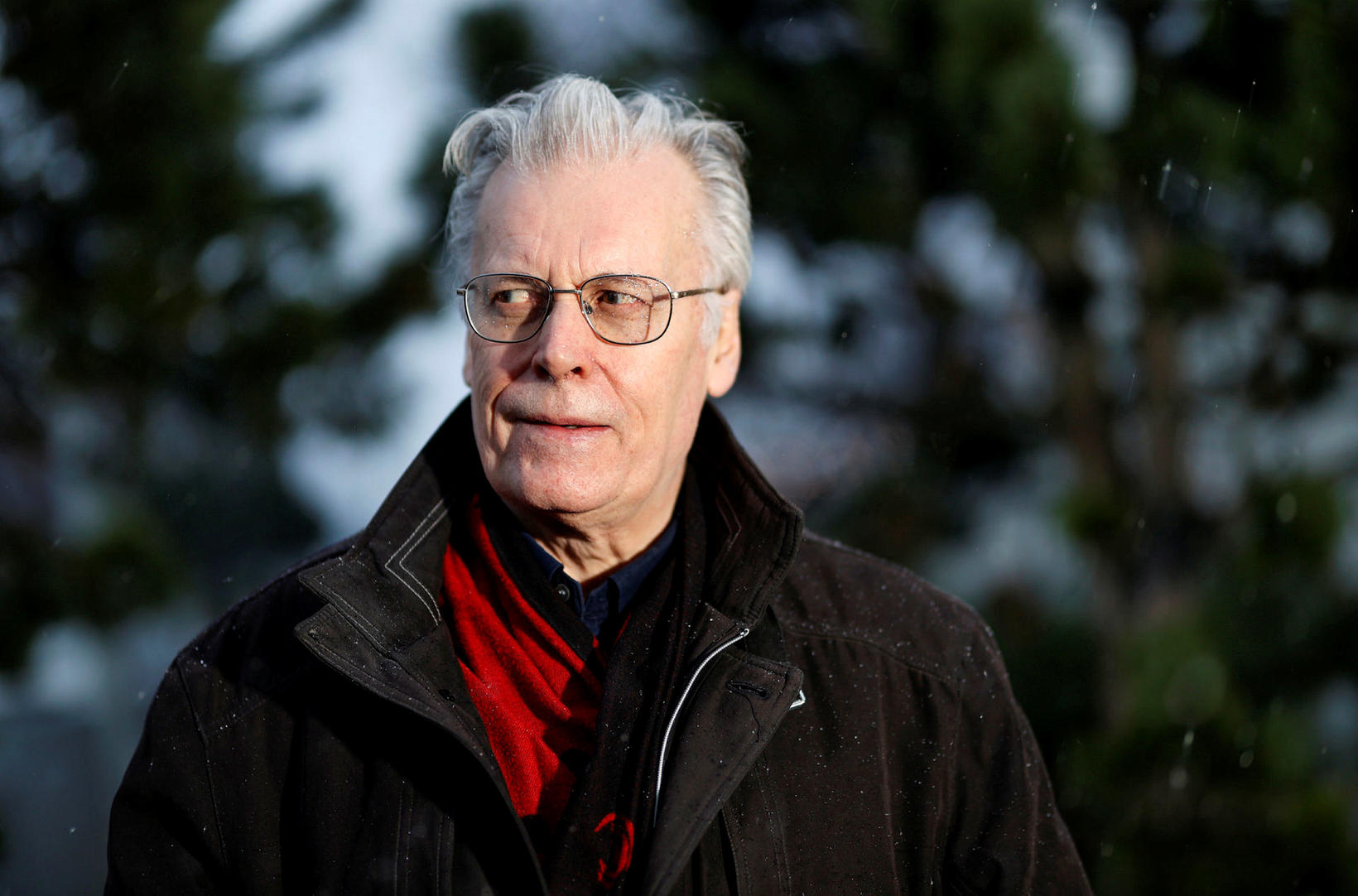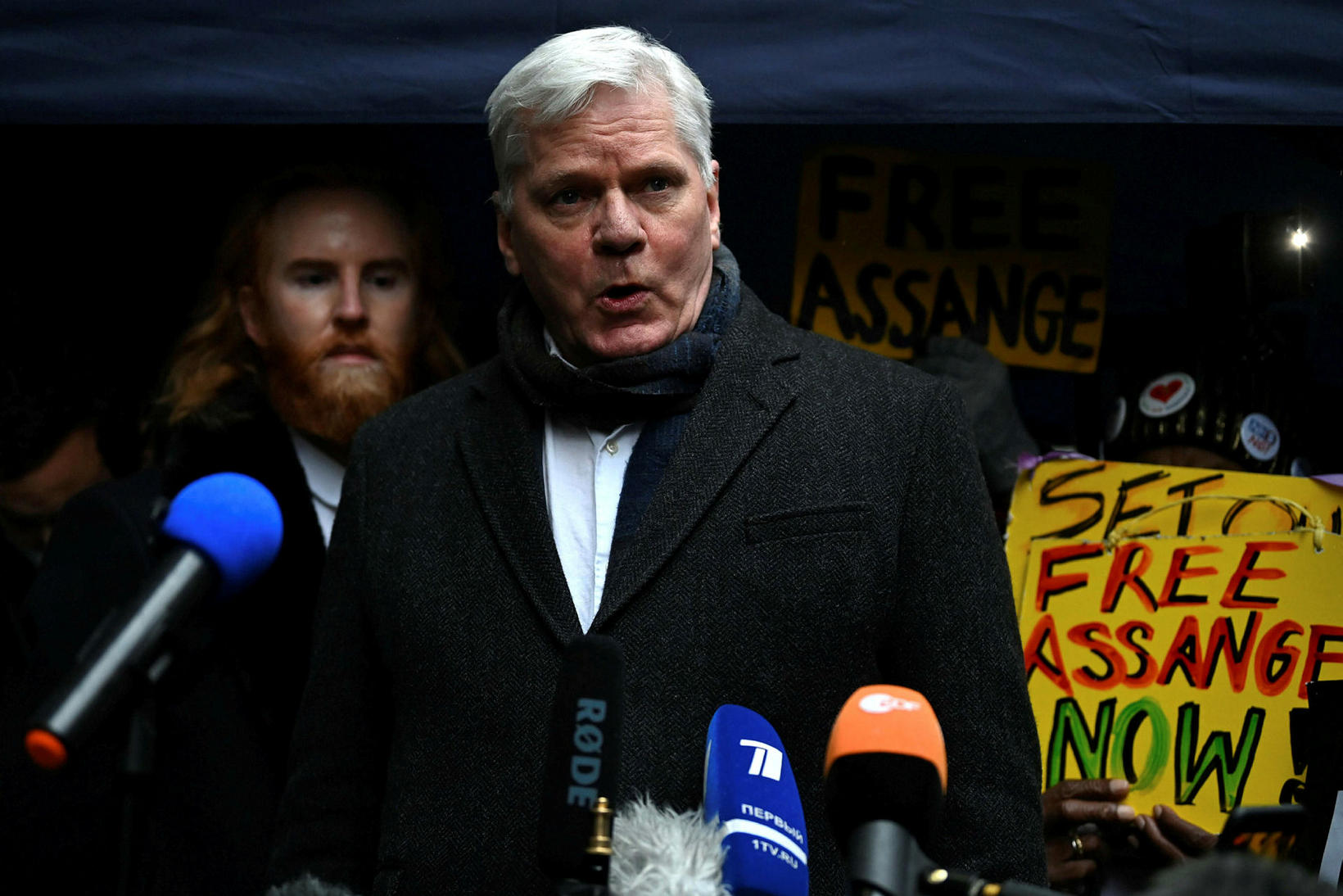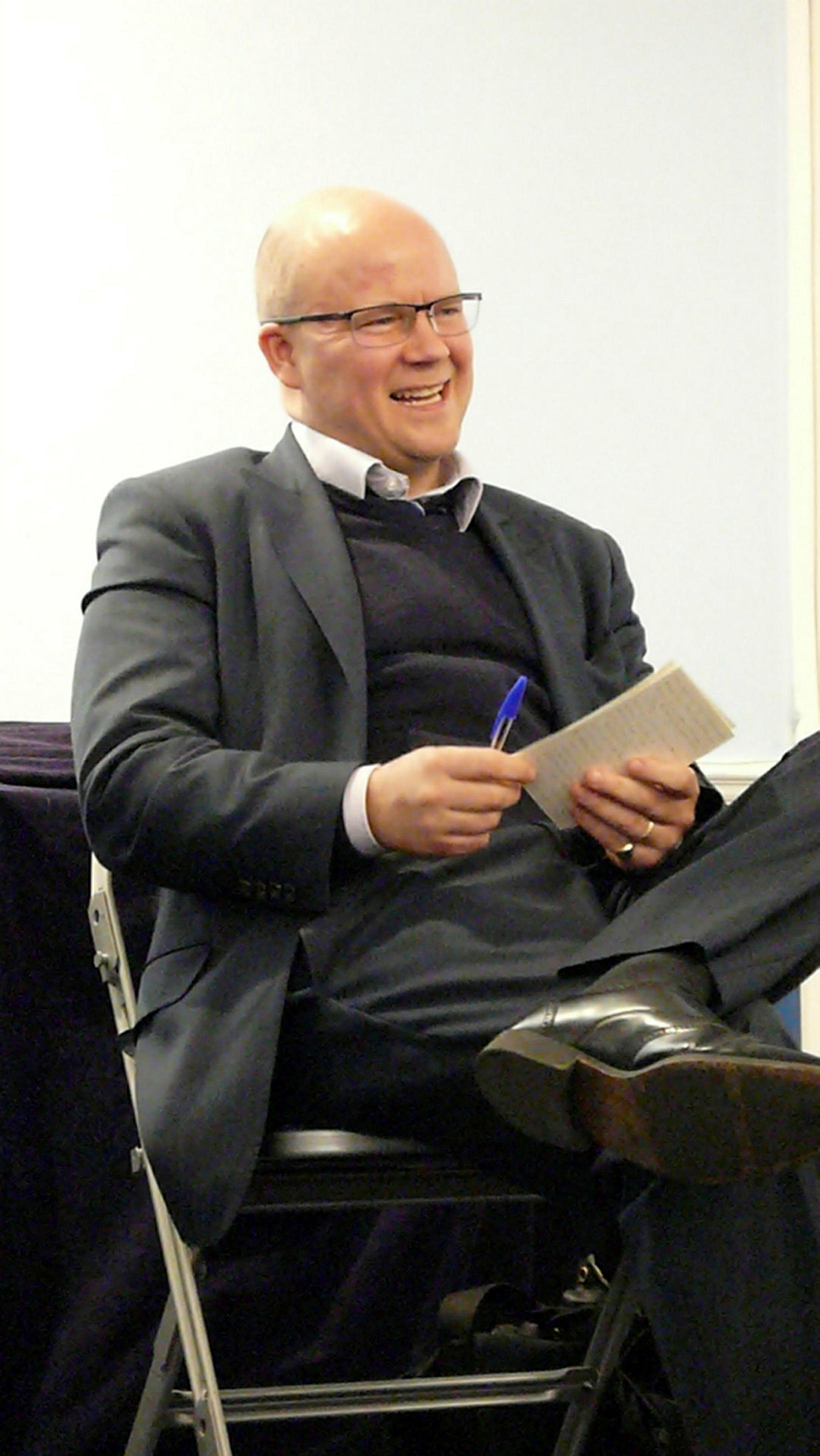Seminar on free speech tomorrow
An activist puts up a banner reading "Free Assange" in front of the US embassy on Berlin's Pariser Platz on December 16, 2022. AFP/John MacDougall
A seminar called: “For the sake of informed debate – a seminar on freedom of speech” will be held tomorrow in the auditorium of the National Museum at 14 PM. The theme of the seminar is the tendency of governments and conglomerates to use cencorship to silence “inconvenient information” to surface under the guise to protect the public.
Three speakers are scheduled in the seminar and there will be an Q&A session after they speak.
Ögmundur Jónasson has been drawing attention to the situation of Kurds for many years and will talk about news about this war-torn group has been silenced by Western governments. mbl.is/Eggert Jóhannesson
Former Minister of the Interior, Ögmundur Jónasson, discusses censorship and silence on the subject of war-torn minorities. For years Jónasson has been active in raising awareness of the situation of Kurds. Tomorrow he will give a talk on how the discussion of the struggle of this war-torn ethnic group is being effectively shut down by Western governments.
Kristinn Hrafnsson, the editor of Wikileaks will talk about the dire situation of Julian Assange, the founder of Wikileaks, who is currently in solitary confinement in Britain awaiting the outcome of the U.S. extradition proceedings against him. AFP
Kristinn Hrafnsson, the editor of Wikileaks, discusses the case of Australian journalist Julian Assange, the founder of Wikileaks, who is currently in solitary confinement in Britain awaiting the outcome of the U.S. extradition proceedings against him. As well as the legal case, the proceedings are based on the fact that Assange became the first to publish documents that exposed U.S. war crimes in Iraq and Afghanistan. Kristinn has just returned from a tour of Central and South America to rally support for Assange's cause.
Toby Young, deputy editor of the Spectator and chairman of the UK Free Speech Union, has been highly critical of his government's actions during the coronavirus era, and has waged many attacks against attempts to silence debate on the subject. Toby Young addresses freedom of expression and personal liberty in a time of ongoing emergency and fear in a message he calls "How Pascal's wager has made us slaves of all people."
Toby Young, deputy editor of the Spectator and chairman of the UK Free Speech Union, will talk about: "How Pascal's wager has made us slaves of all people." Mynd tekin af Wikimedia, ókeypis til niðurhals
Policies imposed without proper scrutiny
We got a hold of Toby Young and asked him a few questions:
- Is free speech under attack in today's polarized society?
“Free speech is in greater peril across the West than at any time since the Second World War. When it comes to certain topics – the Covid lockdowns, the mRNA vaccines, climate change, race, gender – anyone dissenting from progressive orthodoxy risks being punished, up to and including losing their job. The people being punished are often accused of spreading ‘hate speech’ or ‘misinformation’, but those are just euphemisms for ‘an opinion I disagree with’. The opinions people get into trouble for voicing are not unlawful, just heretical. The effect of this suppression is that vast swathes of people are self-censoring, particularly in universities, the arts, the media, the heritage and museums sector and, increasingly, large private companies like KPMG and Goldman Sachs.”
- What are the ramifications of "unpopular ideas" and cancel culture?
“The cost of this censorship is that policies are imposed without proper scrutiny or public debate. A good example is the lockdown policy, which I believe caused more harm than good, particularly to children. We know from the recent release of the Twitter Files that the FBI and other state agencies put pressure on the big social media platforms to suppress voices challenging the wisdom of the lockdown policy and other Covid restrictions, including those of distinguished professors of medicine, like the three original signatories of the Great Barrington Declaration: Jay Bhattacharya, Martin Kulldorff and Sunetra Gupta. Had those voices not been suppressed, Western governments might have abandoned this disastrous policy sooner than they did.”
- What will you be talking about tomorrow?
“I’m going to be talking about why it is that policy makers, whether in national governments or international bodies like the EU and the UN, think it’s perfectly legitimate to interfere in people’s liberty to mitigate low-probability/high-impact risks, such as catastrophic climate change, and what arguments can be marshalled to challenge the resulting policies, such as net Zero. One challenge is that the choice of which low-probability/high-impact risks to mitigate is quite arbitrary – for instance, why aren’t we building expensive defences against asteroids or colonising other planets as a refuges from interstellar attacks by aliens? The reason I want to explore this rationale for curbing people’s freedom – what we might refer to as Pascal’s Wager – is that it applies in a number of areas, not just climate change. It was the logic of the lockdowns and it’s also used to justify curbing so-called ‘hate speech’ and ‘misinformation’. The argument isn’t that allowing unrestricted free speech will cause harm, but that it might cause harm and that is too great a risk to take. The problem with that argument is that it can be used to censor any opinion.”
- How do you respond to those who say that free speech is just the speech you like?
“If you support free speech, you have to defend the right of those you disagree with to speak as well, otherwise it’s just rhetoric. As George Orwell said, ‘If liberty means anything at all it means the right to tell people what they don’t want to hear.’ That includes people like me having to hear what they don’t want to hear.”





/frimg/1/57/87/1578747.jpg)





